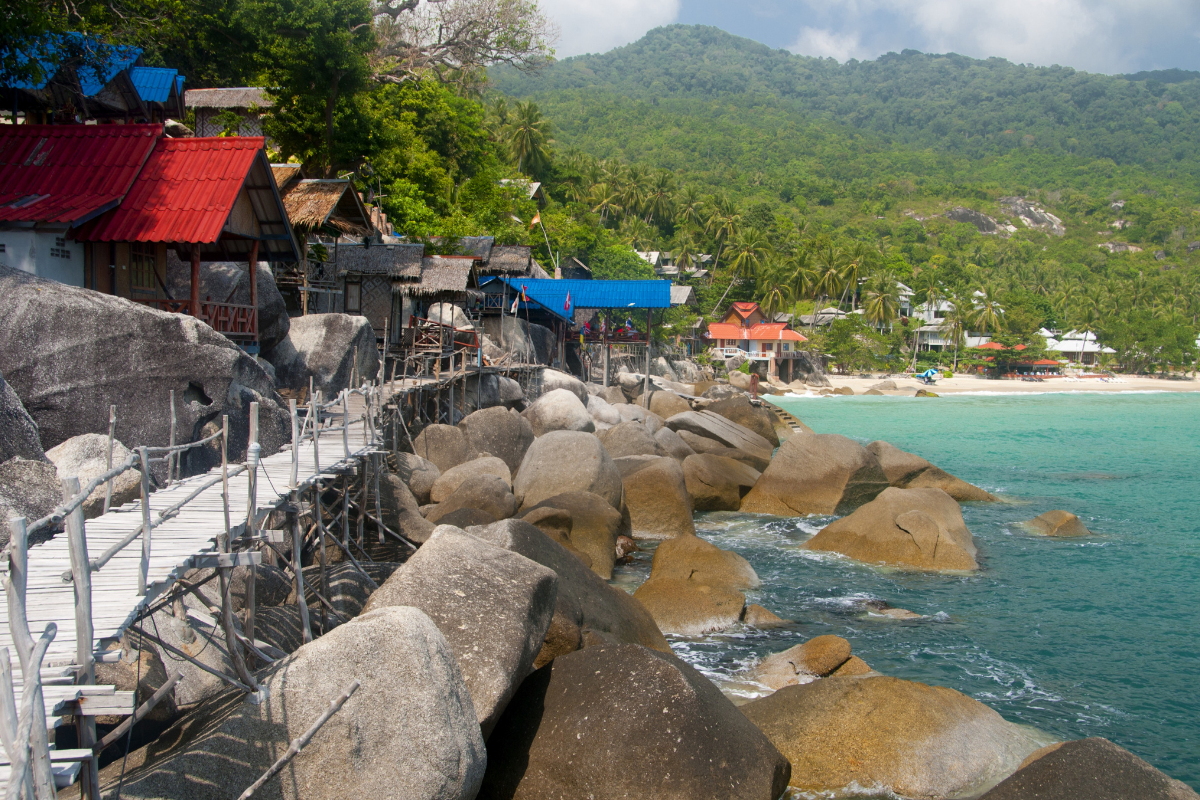Picture this: I’m walking along the tropical streets of Koh Phangan, the Thai island I’ve called home for more than a year now. The salty sea air mingles with the aroma of falafel, and I overhear a group casually chatting in Hebrew. It’s so common here that Hebrew could almost pass for the island’s unofficial second language. When hunger strikes, I find myself facing an unusual dilemma: Should I order shakshuka or falafel? Because, oddly enough, it’s easier to find Israeli food than Pad Thai in this corner of Thailand.
Here’s the twist: With my big, wild curly hair, dark features and conversational Hebrew (delivered with an undeniably American accent), I’m constantly mistaken for Israeli. But I’m not. I’m a Middle Eastern Jew — of Syrian and Egyptian descent — and while I deeply value my roots, my identity is distinctly not Israeli.
Living on Koh Phangan, I’ve stumbled into one of the most unexpected cultural collisions of my life. Known globally as a haven for digital nomads, yoga enthusiasts and Instagram influencers, the island is also home to a thriving Israeli diaspora. Over 200 Israeli families have settled here, alongside hundreds more young Israelis who treat Koh Phangan as a second home. In this environment, being Jewish is almost universally equated with being Israeli. For someone like me, this assumption is both an amusing case of mistaken identity and a broader reflection of how Jewish diversity is often overshadowed by a singular narrative.
It starts with the greetings. “Me-eifo at?” (“Where are you from?”) is the typical icebreaker when someone assumes I’m part of the tribe — their tribe. When I explain that I’m not Israeli but Jewish, it often raises eyebrows. “Ah, but you look Israeli!” they’ll insist, as though my curls and olive skin automatically come with a Tel Aviv address. For some, my explanation invites curiosity; for non-Israelis, confusion. Jewish, but not Israeli? For many in this bubble, the two are inseparable.
This dynamic has led to countless funny and frustrating moments. At times, I feel like I’m straddling worlds: fluent enough in Hebrew to chat about events happening on the island but not enough to follow rapid-fire debates about Israeli politics. My identity — rooted in Middle Eastern Jewish traditions — is often flattened into something more recognizable: the Israeli archetype. It’s a microcosm of a larger phenomenon in the Jewish world, where the rich tapestry of the diaspora is often eclipsed by the dominant Israeli narrative.
What strikes me most is how much this dynamic reflects broader assumptions within the Jewish community. Growing up in Brooklyn, I often felt like an outsider in Jewish spaces that were dominated by Ashkenazi traditions, where bagels trumped baklava and Yiddish words peppered conversation instead of Arabic ones. Here on Koh Phangan, the dominant Jewish narrative has shifted to an Israeli one, but the effect is similar: it unintentionally sidelines the diverse stories that make up the Jewish diaspora.
This assumption — that Jewish equals Israeli — is understandable given Israel’s central role in modern Jewish identity. But it also risks erasing the richness of Jewish history and culture. Jews have lived in the Middle East, North Africa, Europe and beyond for centuries, creating distinct traditions and narratives. When we reduce Jewishness to a single story, we lose the beauty of its complexity.
Despite the misunderstandings, I’ve come to appreciate this community for what it is: a melting pot of seekers, dreamers and wanderers, much like myself. While I’ll always have to explain that my Hebrew is American-accented for a reason, I’ve found surprising connections here. Israelis, despite the assumptions, have embraced me with warmth and curiosity, eager to hear about my own journey and traditions.
Living in Koh Phangan has taught me that identity is rarely neat. It’s a patchwork of heritage, experience and self-definition. For me, it’s being a Middle Eastern Jew proud of my Syrian and Egyptian roots while navigating the nuances of being seen as something I’m not. It’s a dance between belonging and individuality, between explaining and simply being.
Koh Phangan has become an unlikely backdrop for my exploration of Jewish identity. Amid the Hebrew chatter and the aroma of falafel, I’ve found a space to reflect on what it means to be a Jew in the diaspora — and how our diversity is both our challenge and our strength. In a world that often insists on neat categories, I’m learning to embrace the complexity of my story and the messy, vibrant stories of those around me. Because in the end, whether you’re Israeli or not, there’s something profoundly uniting about sharing shakshuka on a Thai island far from home.



